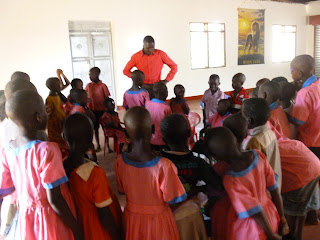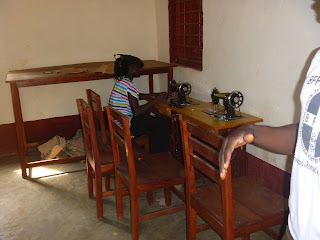Tuesday, February 7th, 2012
Julius’s Group and the Secondary School Students
Twice a week on Thursday and Tuesday mornings, Julius, who works with us, is a research assistant for professor at Long Island University. Check out the links below for more information about his work for Professor Geoff studying the relationship between families and reading culture.
With the Primary 5 class we read a story called Daudi’s Dream. Before, we had only been reading Akimbo and the Lion by Alexander McCall Smith, but we thought that for this class (we found that the younger classes had a bit of trouble with the chapter book by McCall-Smith) we would read them a picture book. For a picture book Daudi’s Dream is relatively long with three chapters, but it looked really good. It was about a small boy named Daudi whose family was very poor and they didn’t have enough money to buy food. His mother mentions that she used to have a sewing machine but she had to sell it, and Daudi vows that he will buy his mother a sewing machine so that she can support the family. He does this by collecting bottle caps and getting money back for him. The rest of the story is about his trials and successes in doing so. We only got to the first part of the story on this day.
For me it was difficult to read this story to the kids, because although it was at their level and it was a story they could relate to, I felt bad when I looked in some of their eyes and I could see that the story really hit home. They connected to it like I hadn’t seen kids connect to other stories, but it broke my heart because when we read about Daudi being hungry, they understood. Later though I asked Dan what he thought, if it was bad of us to read this story, he told me that no, it was good. People need to hear stories that they can relate to, even if the stories are sad.
Thinking back on it, I agree. Hearing stories about people who are like you gives you another lens through which to see your own life, but more importantly it shows that your story matters. You matter. Your life matters. It isn’t just something that has no place in the world, but something as significant as the stories about rich white children in West with their blonde hair and their apples. That may have sounded bitter, but this is a cause I have come to have a lot of empathy for.
Women’s Group B - English and Computers (Go Pheonah!)
This week with the women’s group our theme was Clothing. We did vocabulary, wrote a dialogue about going to the tailor’s, wrote a short segment, and then did it all with the women. Before, as per usual, the women worked on typing on the computers.
Friday, February 10th, 2012
Vienna
On our way to visit Julius we accidentally chanced upon a place called Vienna. It serves casual drinks and is very nice. We had a lot of fun dancing to muzungu music while no one else seemed to care that it was playing and then sitting and chatting a bit too close to the speakers. Great night; I preferred it to Ambiance.
Saturday, February 11th, 2012
We didn’t do much this Saturday. It was my mother’s yartzeit and I lit the candles in the evening.
Tuesday, February 14th, 2012
Valentine’s Day (Ten Tables and Vienna)
Valentine’s Day was wonderful. Dan and Amelia went in the evening out to dinner somewhere in town. Amelia wanted to go somewhere that served tilapia; it’s her favorite fish. We went to Ten Tables, which we had visited once before. Ten Tables is a wonderful place. Downstairs there is a restaurant with, surprise, 10 tables. We always go upstairs, however, where there is a rooftop terrace. There are four or so palappas with tables underneath, and lit by small paper bags filled by sand.
Every night they have a set menu, which ensures that the food is not only there, but fresh. A three course meal costs 20,000 Sh ($8.14 CAD), and it’s ridiculously good. That night there was an option of the full course and wine.
I think my favorite part was the flowers that we were given by the owner. All of the women got one, and it was really cute because those who gave out the flowers went around and asked the women beforehand if it was okay to make sure that no one was offended.
Wednesday, February 15th, 2012
Prep Work
We did some prep work for the next week - which was all about nutrition with the women's group, as well as some information about the benefits of goat's milk. Interestingly enough, although so many people own goats, goats' milk isn't drunk very much. Apparently this is due to a combination of stigma (people think it tastes goaty) and practicality (local goats don't produce much milk, and foreign goats are sometimes very sensitive to the sun and the like). Anyways, we did vocab and pictures and research etc. all day.
Thursday, February 16th, 2012
Blessed Foster Family Foundation for Volunteers
BFFF is a big project. Rather, it is a multitude of projects. I am going to try and summarize them all here, but I am writing this a month after I went. We met with Prince, who is one of the founders of the organization. Happily, BFFF is a locally run and started organization. It isn’t too far from the library; only about 5-10 minutes on a boda.
Among the services they offer is, surprisingly, a newly opening guesthouse. There are only a few rooms, but it is a good income-generating project.
There is also a daycare for orphaned children. Prince wants to turn it into an orphanage, but he doesn’t currently have the resources. People come in and teach the children during the day, hoping to give them access to education. They also have a period during each day where they can play and run around, much like P.E. or perhaps recess back at home.
They are currently building a health care clinic. There is also a station where people can get easy, close access to affordable filtered and clean water. What is affordable? Only 150 Shillings for 1 full jerry can of water (That’s about CAD $0.06 - not that it matters. Most people where we were don’t earn enough for that to be as cheap as we consider it. However, it is WAY cheaper than the alternative, which is about 1,000-1,500 Sh.)
They also have a small library, which is how they came to be part of the Uganda Community Library Association, where we first met Prince.
There is also a sewing training center where women can practice their sewing skills so that they can learn to be tailors and the like.
New to the project on the self-sustaining end is a pub and bar. We ate there for lunch, and it was really good. They serve the usual fare; squash, beans, cabbage, and rice. They also have drinks like sodas and beer.
On the side, Prince also builds energy saving stoves. These stoves are actually pretty cool. While most people may cook over an open fire, if you use one of these stoves it keeps the heat in and saves energy. Here especially saving energy really matters. Energy in this case is not some sort of magical electrical current that comes in and out when you flip a switch. The energy involved is wood, wood that you actually have to find and get yourself.
Oftentimes it is schoolchildren who have to get the wood for the stoves after school. Usually they have to walk for a long time, sometimes many kilometers to get the wood. Adding on this is that this is sometimes after a long day of school, and long walks to and from school (which are sometimes over 10 kilometers!). (On a side note, this is why some people are advocating growing fast-growing trees around one’s property line. If you grow these trees, often within a year you will have access to wood to use for stoves.)
Anyhow, my point is that saving energy with stoves is a big deal, and these stoves even have places to put your pots easily.
Several pigs are also being raised for breeding and food purposes. Prince plans to sell the pigs as an income-generating project. Apparently pigs can be quite a good source of income.
Also, not too far away in the village center they are currently building a micro finance center. It’s the red building in the picture.
BFFF currently supports the education of many students, giving them scholarships and financial help to go to school.
In the future, Prince also hopes to begin a university on his absolutely massive plot of land not too far away. It’s the area we always pass on our way to Masaka, and it’s beautiful. We took an unnatural amount of photos.
Clearly, there is a lot going on at BFFF. Most of the programs are run by volunteers, many of whom are international, but some of whom are local, like Pheonah, who also comes to the women’s group at the library. The funding comes from a mix of international donors and income-generating projects. Prince aims to eventually be self-sustainable, however, hence the pub and bar, the piggery, etc. It’s hard to do all of these things, there isn’t a lot of money going around, sometimes there is a lack of volunteers or support, but there is a lot of passion in the project. Prince is clearly very passionate, people are involved, and there is a lot going on.

















No comments:
Post a Comment